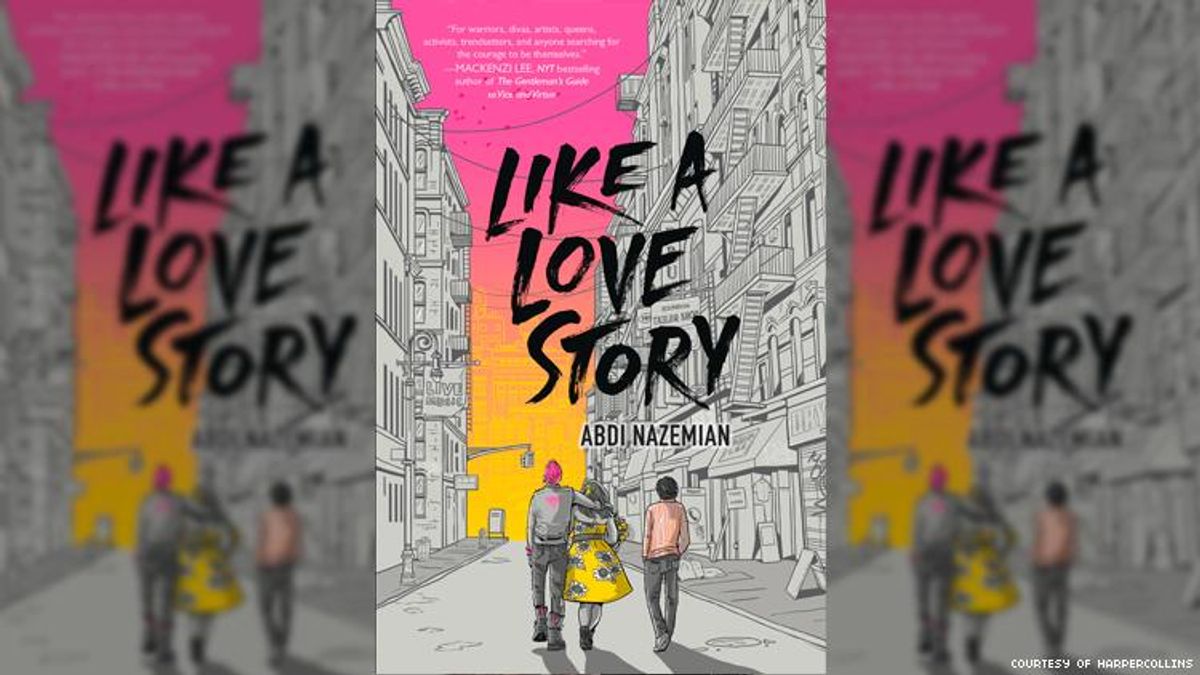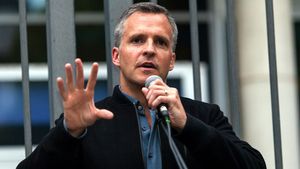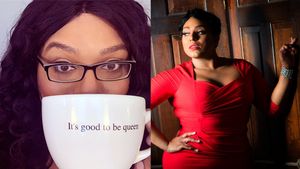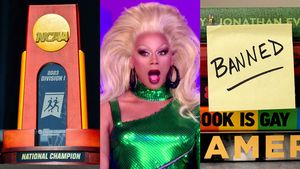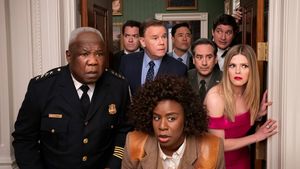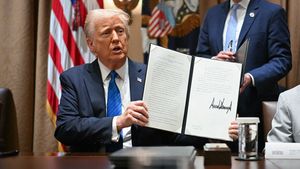Abdi Nazemian, a proclaimed Iranian-American producer on films like Call Me By Your Name, has released a blistering and beautiful book that follows the life of three teens growing up in the AIDS activist scene of 1989 New York. There's Reza, an closeted Iranian boy who has just moved to the city with his mother to live with his stepfather and stepbrother. There's Judy, an aspiring fashion designer who worships her uncle Stephen, a devout member of ACT UP. And then there's Art, Judy's best Judy, and their school's only out and proud teen. The novel is a gorgeous testament to friendships in the face of adversity, budding sexuality, and the ways love can be a revolutionary act.
Like A Love Story (Balzer + Bray), will be on sale June 4, 2019. Here is an exclusive excerpt that was truly *chef's kiss*. --Fran Tirado, Deputy Editor
As I sneak around the side of the building, I see a few media trucks parked outside, and I see spectators, a lot of them, frozen across the street, staring at the building. Maybe we've helped them see something.
And then I see something . . . Reza. At least I think it's him. He's in that crowd, staring at the building with fascination. I crane my neck forward trying to get a better look. I take a step closer to the crowd. But I still can't be sure. I put my camera to my eye and I zoom in on the crowd. And through the lens I can now see him clearly. He looks forward, until he doesn't. Until he looks right at me. I click. And then he rushes away.
I can't tell which direction he went, but I run. I want to know what he was doing there, and why. But I don't see him anymore. I walk past countless buildings, countless people, but I can't find him. Finally, I give up. I need some water, and I turn onto Fulton Street, where I see a deli. Next to the deli is a record store, and inside is Reza, browsing nonchalantly.
"Hey," I call as I walk into the store, but he doesn't look up. "Reza!"
Now he looks up. "Oh, Art. Wow, hi, wh-what are you doing in . . . this place?" He's nervous and stammering, and so full of shit it reeks.
"Um, what are you doing here?" I ask.
"Oh, I heard this was a great record store," he says. "And I just received my allowance, so . . ."
"So you decided to go record shopping at nine in the morning . . . on a school day . . . blocks away from where you knew I was protesting."
He looks down at the records, f lips through a few, maybe deciding what to say next. "If we go to school now, we will only miss one class."
"I'm not going to school today," I say. "I can't. Not after what just happened."
"What just happened?" he asks.
He looks at me blankly, and I search his eyes for what is going on behind them.
"I was at a protest," I say. "You were there too. I saw you."
"No," he says, now suddenly cool as can be. "But white people think all Persian people look alike. It's okay, though. I'm not offended."
I smile in disbelief. He has mastered the art of deflection, and also, he's been hiding a dry sense of humor.
And then he changes the subject, pulling a record up. "Look," he says. It's Madonna's Like a Virgin record. There she is on the cover, in a wedding dress. "Is this a good one?"
"They're all good ones," I say. "She doesn't do mediocre."
"Maybe I will purchase it," he says. "Since I already have the Like a Prayer CD thanks to you. But I think I prefer records. Do you think they sound better?"
I don't know what I'm supposed to say. I don't feel like bantering about the vinyl versus compact disc debate right now. I want to know why he was there, and what his deal is.
"Why does she call her records Like a something?" he asks. "Do you know?"
"I don't know for sure," I say. "But I think it's because she's all about the difference between what something looks like and what it really is. She's like a virgin, but not really. Something is like a prayer, but not really. I guess she's pointing to the illusion of sex and religion."
"Oh" is all he says.
But I can't stop. Now we're not bantering anymore. Now we're talking about something deadly serious . . . Madonna! "Uncle Stephen thinks that's why she's so popular with gays. Why divas in general are so popular with gays. Because we can see what's hiding beneath the artifice. We know what it's like to be one thing on the outside and another on the inside. All of us."
I realize I've started speaking of we and us, as if I'm including Reza. And he doesn't correct me. And I have no idea at what moment I thought--no, I knew--that he was one of us. Does he know it? Am I wrong?
"That's why Stephen thinks we'll always be more into female divas, even when the world is enlightened enough for gay men to be pop stars and movie stars. Because worshipping a gay male star would be too literal for us. We need layers and symbolism. We communicate in code. As does Madonna. That's what I think the Like a thing is all about."
Am I communicating in code? And if I am, what the hell am I even saying?
"I see," he says now, and he sounds so proper, so stiff, so scared. We lock eyes, and I find in his a sadness so deep and bottomless that I want to reach inside him and heal it. And in his sadness, I recognize my own, which I usually cover up with anger. I have a crazy thought . . . if he's from Iran, he probably knows a bunch of people who died in the revolution, just like I know a bunch of people who died of AIDS. Most of the other kids in school don't know anyone who died, except for their grandparents maybe.
I reach into the Madonna section to pull out another record, and as I do, our hands graze each other. I feel something. Is it electricity? I don't know. It feels like a cousin of what I felt up there at the protest. It feels like being reminded that the point of BEING alive is to FEEL alive.
"In between Like a Virgin and Like a Prayer, she released True Blue," I say as I pull the record out. "It's interesting, right? Sex and religion aren't clear-cut to her, but love is. She didn't call it Like a True Blue."
"Like a Romance," he says.
"Like a Love Story," I add.
We each hold records in our hands, our fingers touch each other, and our eyes are locked in some secret shared space we never knew existed until just now.
And then he says, "I'll purchase them both. I think I love Madonna." And he pays for the records.
We walk for a bit, toward the subway. He says he's afraid of taking the subway, and I tell him that's absurd. "The subway is the one place in the city where you can be guaranteed not to run into the exact kind of assholes who are afraid to ride the subway," I say.
He asks if I just called him an asshole, and I say maybe. We might be flirting. Or we might not be. I have no idea how to read him.
Then I remember something. "Hey, you have my backpack?"
"Your book bag," he says. "I am so sorry. It's been sitting in my room for days. I promise I haven't touched it." I think about what's inside, a bunch of junk, and then
I remember my most prized possession is in there . . . those notecards Stephen made me when I asked him what OUR history was. I can't believe I left those. That shrink my parents sent me to would probably say I left the bag there hoping Reza would open it, hoping he would read those cards and feel what I felt when I read them . . . some connection to the past, to a community, some sense of belonging. "It's okay," I say. "Just give it to me next time we see each other."
"Okay," he says.
He's about to go when I call him back. "Hey," I say. "I'm just wondering . . . were you in Iran during the revolution?"
"I was," he says. "My mother wanted to leave, but my father didn't. We went to Toronto six years ago, when my mother left him."
"Oh," I say. "So your dad's still there?"
"No," he says. "Well, not exactly. He, um, died."
There's something so final about those words. He doesn't embellish them. He doesn't say he passed away, or something like that. "I'm so sorry," I say.
Reza shrugs, like there's nothing else to say about the subject.
"I've lost a lot of people too," I say. "People I knew through Stephen. They've died. All around me." I stop myself from saying more. What I'm thinking is that if Stephen is my spiritual father, the dad I was meant to have, then we're both being raised by widows. But I don't say that. Because Stephen's not my father, and because Reza doesn't look like he wants to continue this conversation.
"I'm sorry," he says. "Death is never easy."
"Yeah, death sucks," I say. And then, desperate to end on a positive note, I add, "But life can be awesome, right?"
Like A Love Story (Balzer + Bray) by Abdi Nazemian, will be on sale June 4, 2019. Copyright (c) 2019 by Abdi Nazemian. Reprinted with permission of HarperCollins Children's Books.
